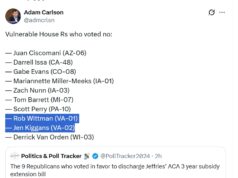by Kellen Squire
Old growth forests are one of the most important parts of the Earth’s ecosystem. These trees last for generations, even millennia (or longer!), and provide protection to hundreds of thousands of species of plants and animals, and do the very work to keep the planet alive and habitable for the human race.
The trees that make up forests are highly sought after. They’re incredibly durable. and useful in so many different functions. Unfortunately, every tree cut down is a tree gone forever, leaving a hole that cannot be replaced, even by replanted trees. The indiscriminate felling of these trees is not just folly, it’s potentially suicidal, leading to an acceleration of climate change that could make human life on the surface of the planet completely untenable.
I think about those forests a lot when I think about what’s going on amongst healthcare providers in the United States of America. As an ER nurse, I’ve written about the effect the COVID-19 crisis has had on emergency and acute services providers on more than one occasion, but I think it’s clear there are a lot of people who don’t appreciate the magnitude of the apocalypse on the horizon.
Efficiency is fine, but it only works in a predictable environment. If we know for sure that we’ll get exactly 100 patients a day, and we know approximately how sick each patient will be, and that no staff will call out sick, an efficient environment works. It’s obvious how quickly relying on those metrics can devolve. But, beyond that, basing acute medical care on efficiency metrics requires you to utilize providers that are incredibly talented; they’re smart, well trained, proactive, hardworking. Those people are hard to come by, though, taking years to train appropriately—training that relies on a cadre of experienced professionals to mentor them along the way.
Without that core group, our country would have already been sunk. The 10-year RN Work Project study found 17% of newly licensed RNs leave their first nursing job within the first year, 33% leave within two years, and 60% leave within eight years; those rates are an average across all nursing professions. The same study found that it is not uncommon for ICU and ER turnover rates to be as high as 90% over a 10-year period.
It’s that remaining 10% of staff that holds the entire system together. They’re the old growth forests of the healthcare world. They’re the ones who keep all the holes in the community social net stitched together. And they do it quietly, out of sight and out of mind, keeping the system stable.
This tweet struck me as a good summation of this entire state of affairs.
Now, with COVID-19, we have only supercharged this problem. We have a group of dedicated professionals who have been wrecking themselves to keep our country running—to keep our healthcare system from collapsing. We have politicians and leaders in every state and from every party who are content to give those same people a pat on the back and laud them as “heroes,” while counting on them to take the fire so they don’t have to take political fire themselves.
I can attest to this personally. I have had more people than I can count shrug at me when I tell them what we’re going through in the ER, in the ICU, on the COVID-19 units. “I mean, we’d love to do something,” they tell us in so many words, “but I’ve got reelection to think about. I’ve got limited political capital I can use on bringing attention to an issue, and I’m not using it on this.” And then, with a somber tone in their voice, pat me on the shoulder and say, “But I appreciate the hard work you and your colleagues are doing! You are all true heroes!”
That attitude—which affects far more people than just those of us on the frontline—is going to result in a wholesale evisceration of the very group of providers that are keeping things from going off the rails. They will hang on until we, as a country, get to the other side of the pandemic … and then they will leave the healthcare field forever, creating reverberations and cascading consequences that will take generations to resolve, if ever. This isn’t even considering the likely permanent personal costs the providers involved will incur in the process of doing that.
If we’re content with abusing healthcare providers and other frontline workers to keep the country and economy rolling at the cost of their health and well-being, then the very least we can do is aggressively pursue strategies to ensure we don’t lose these talented, dedicated people forever.
Aggressive mental health and wellness programs aimed at frontline workers and providers are a necessity. These programs need to be proactive. I can’t tell you how many times I’ve seen programs aimed at my colleagues go unused because we tell ourselves, without a shred of irony, “Well, we see so many people who have it so worse than we do, we have no business using those resources when we see so many others unable to.” There is also a stigma amongst emergency services providers against asking for help, where doing so is sadly perceived as being a “weakness.”
Proactive retention and incentive programs aimed at keeping people in critical positions. This is particularly in high acuity areas such as the ER, ICU, respiratory therapy, as well as the “unsung” positions that keep everything else going, such as the housekeepers and janitors who clean and sanitize COVID-19 rooms for 12 hours at a time. They’re arguably in just as much, if not more, danger than anyone else who interacts with COVID-19 patients. We need these programs now, before we see an unrecoverable “brain drain,” a mass exodus headed for the door.
Putting permanent protections into place to ensure that we never get asked to hold the line again for a federal government unable and unwilling to do so. Honestly, no frontline worker should have to pay a dime in federal income tax this year, after being asked to risk their lives for a government that didn’t give a damn about them. Let Jeff Bezos, Elon Musk, and the like pay it instead. But that’s only a temporary fix; we need to onshore critical national security supply chains, so hospitals don’t have to bid against each other to buy masks from an adversarial country. We need safe staffing ratios and mandated protections so we can do our jobs safely.
And, last but not least, we need systemic change to the healthcare system in the United States of America, now.
Part of the problem is that emergency and acute care providers are responsible not just for the “big” stuff—broken bones, kidney stones, heart attacks, strokes, etc.—but for a stunning percentage of the primary care provided in our country, particularly amongst underserved populations. Tens of millions of people shouldn’t have to rely on the emergency room for checkups and vaccinations, or to desperately try and fix what goes wrong from going without such basic care in the first place, but they do.
This is what we must keep in mind when calculating the cost of the fallout from crushing healthcare providers. They do so much more for our society than most people realize. We need to address the care and access inequities that have brought us to the current state of affairs, and we need to do it today, instead of dithering and shaking our heads in sorrow. Any way you cut it, the cost of inaction on this issue will dwarf the cost of putting these programs into place.
Sure, we managed to save our country by the barest of margins, but the fight to keep it has only just begun. We have one shot, here and now, to address these issues.
Otherwise, we’ll find ourselves gazing over burned-out fields and eroding hills, trying to remember the towering forests that stood once proudly, protecting us all.
If we value our future as a country, as a society—and as a species—we cannot let this opportunity to do the right thing pass us by.


![Video: On ACA Subsidies, Fmr. Rep. Tom Perriello (D-VA05) Says Rep. John McGuire (R-VA05) Is “kick[ing] those people [he represents] to the curb…[to] give another tax credit to Elon Musk and Peter Thiel”](https://bluevirginia.us/wp-content/uploads/2026/01/perrielloaca-238x178.jpg)








![Video: On ACA Subsidies, Fmr. Rep. Tom Perriello (D-VA05) Says Rep. John McGuire (R-VA05) Is “kick[ing] those people [he represents] to the curb…[to] give another tax credit to Elon Musk and Peter Thiel”](https://bluevirginia.us/wp-content/uploads/2026/01/perrielloaca-100x75.jpg)